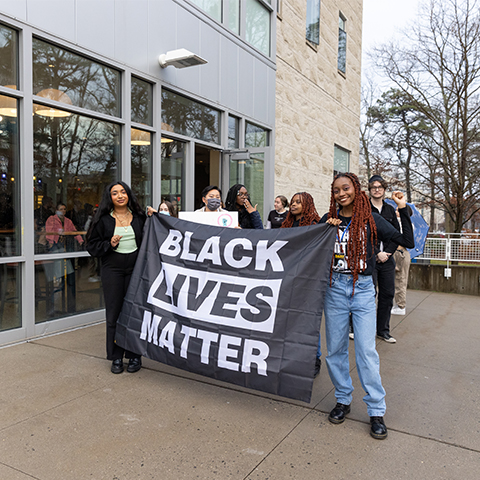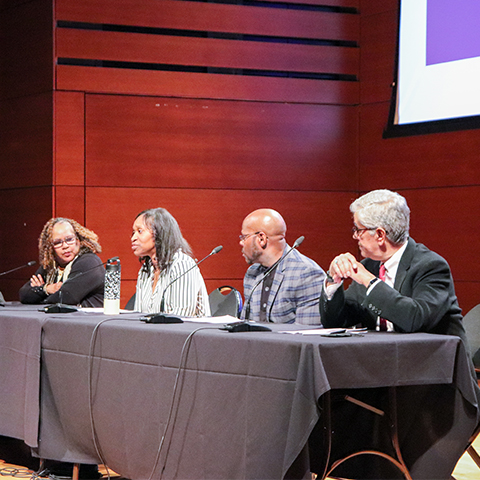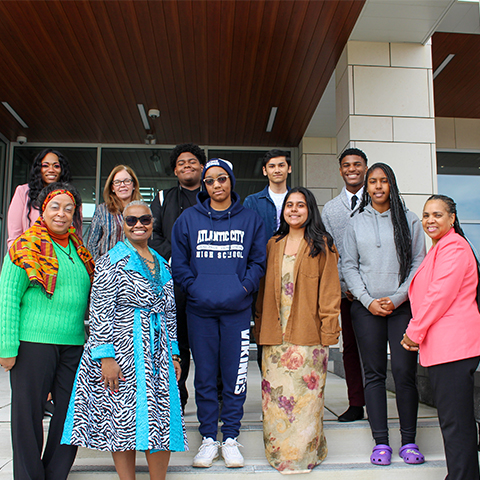Pan-African Flag Raising Kicks Off Black History Month
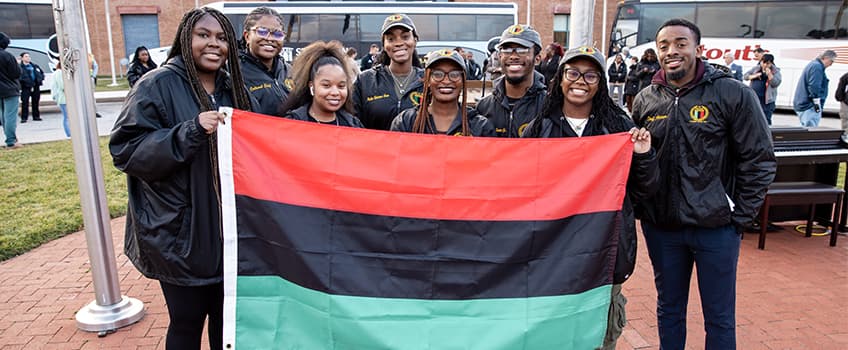
The Unified Black Student Society raised the Pan-African flag on Thursday, Feb. 1, to launch the Black History Month celebration on Stockton's campus.
Galloway, N.J. — Did you know that the Pan-African flag was the first flag of cultural heritage to be permanently displayed in the Arts & Sciences Circle at Stockton University?
According to Haashim Smith-Johnson, an Admissions recruiter and former president of the Unified Black Student Society, the idea of having the flag raised for more than the month of February came out of the organization’s desire to make a statement on campus in 2017. He encouraged students to honor the organization’s legacy through decisive action when thinking of ways to make Stockton an inclusive campus for everyone.
“This one thought turned into action, which turned into Black Stockton history,” Smith-Johnson, who is currently staff advisor for UBSS, said. “Student leaders of UBSS and all of the other adjacent student organizations: no idea is outlandish. Please continue to represent the culture and advocate for yourself. Your future self, as well as future generations of marginalized Stockton students, will absolutely thank you.”
This was just one of many valuable lessons that attendees heard during the annual Black History Month Flag Raising on Thursday, Feb. 1. Following a beautiful rendition of the Black national anthem, “Lift Ev’ry Voice and Sing,” by student Lillian Nickels and professor of Music Beverly Vaughn, several speakers all had a common thread — the importance of acknowledging history that future generations will learn from and study.
In her remarks, Terricita Sass, Stockton’s executive vice president and chief of staff, boldly proclaimed that Black history is intrinsically tied to American history and that the absence of Black history is an ahistorical “distortion.” She implored the audience to learn more about prolific previous leaders, such as Carter G. Woodson, the creator of Black History Month’s predecessor “Black History Week;” Vera King Farris, the first Black female president in Stockton’s history and Juanita J. High, a former Stockton administrator and Foundation Board member.
“Black history is like a great play. It is a musical and a movie. It takes you on a journey of self-determination, community support, struggle, perseverance, triumph, victory, family and pride, just to name a few, and I'm sure you can add to that list,” Sass said. “Black history is happening today, and it will happen tomorrow in spite of the challenges that we face. Students, intellectuals and scholars, the fact that you are here at Stockton is a testament to your own determination and your own history.”






Olutoyosi Aboderin, the dual-credit coordinator for the Africana Studies program, described the current climate of Black history being maligned in schools and diversity initiatives being dissolved and urged attendees to remember the true purpose of Black History Month.
“It was created to educate the world about the accomplishments of the Black community that were so often ignored and erased. It was created to correct the miseducation and corruption of Black history, which did not start with enslavement but with thriving civilization and kingdoms for people existing on their own terms with their own languages, spiritual systems and economies. It was created to make sure the names of the many black inventors, leaders and change-makers were as commonly known in households as the many white names. The goal wasn't just to have a carefully curated month of Black-themed events and programs but that the celebration and respect of Black humanity would be normalized and ingrained into our daily lives. Let’s continue to push toward that goal,” Aboderin said.
Students Victoria Odeworitse and Ann Delva echoed such sentiments and concluded the speeches by looking toward the future.
“Our resilience is a testament to the power, determination, perseverance and unyielding belief in the inherent worth and potential of every Black life, but our journey does not end here. As we stand on the shoulders of giants, we recognize the responsibility that comes with our resilience. We must continue to advocate for justice, challenge the status quo and champion equality. We must be the change we want to see in the world, for our resilience is not just a personal triumph; it is a thundering call for a better future where everyone, regardless of their background, can thrive and shine,” said Odeworitse, president of the African Student Organization.
“Black History Month is not just a moment in time. It is a continuous journey of discovery, learning and growth,” said Delva, president of the Caribbean Student Association. “As students, let us actively participate in this celebration by embracing opportunities to expand our horizons, challenge our perspectives and contribute to the creation of a more equitable and harmonious world. If there's one takeaway from the speech, remember that as a race, we are not confined to societal standards. We have and continue to be the blueprint of society.”
More Events for Black History Month
No items to display
Annual Flag Raising Encourages Students to Celebrate Black History
February 2, 2023
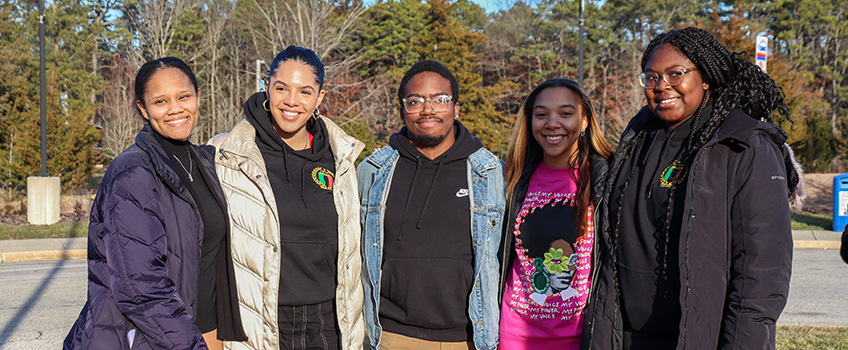
Executive board members of the Unified Black Students Society (UBSS), left to right: Janet Martin, '23; Kira Key, '23; Anthony Brooks, 23; Tamara Farrow, '23; and Vanessa Bauwah, '24. Photo by Eliza Hunt.
Galloway, N.J. – “Part of (Carter G. Woodson’s) mission was to make sure that not only Black people learn about themselves, but for everyone to learn about the contribution of Black history and culture because it is foundational to this country. There would be no country without it.”
Donnetrice Allison, professor and chair of the Africana Studies program, delivered a powerful speech during the Unified Black Students Society’s (UBSS) annual Black History Month flag-raising on Feb. 1 in the Arts and Sciences Circle.
She explained how the month stemmed from African-American historian Woodson’s Negro Education Week, which sought to explore the various contributions and accomplishments of people of African descent.
The lack of education surrounding African-Americans in history – even at historically Black colleges and universities – troubled Woodson as it “limits a people’s progress and ability to move forward if you tell them that they are less than or suggest that they and their forefathers did nothing to contribute to this nation we call America.”
– Story by Loukaia Taylor
– Photos by Susan Allen
